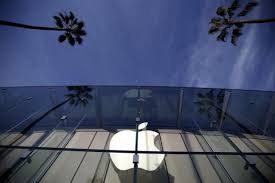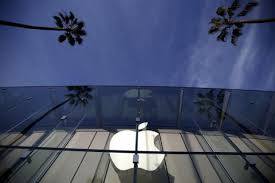
If the Obama administration chooses to dramatically escalate a dispute with the European Union over Apple's tax bill, it would be able to do so due to U.S. tax law that it power to double tax rates for European companies.
Experts said that courts might strike down that action because of treaties even if it did so and that the administration was unlikely to take such a drastic measure.
The power to the US president to double tax rates for citizens and corporations of any country the administration considered was discriminating against U.S. companies is granted by Section 891 of the U.S. tax code, passed in 1934 but never used.
While such drastic measures have been proposed to be put on the table by Democratic and Republican lawmakers due to what they see as overreach by the European Commission in a tax grab targeting American companies, the U.S. Treasury on Wednesday declined to comment on whether Washington was considering such measures.
On Monday, US tech giant Apple was ordered to pay up to $14.5 billion in back taxes to Ireland by the European Commission.
"This is an option that is viable only in the minds of a handful of analysts who seem willing to put the entire global trade order at risk," said Edward Kleinbard, a professor at the University of Southern California in Los Angeles.
While not mentioning measures the United States might take, Treasury Secretary Jack Lew has said the European Commission action appeared highly focused on U.S. companies. The department would work with the EU to prevent erosion of tax bases, a Treasury spokesperson on Tuesday.
It is highly unlikely that such drastic measure would be taken against one of the country's closest allies and biggest trading partners of the US, say legal scholars.
"This is crazy talk," said Daniel Shaviro, professor of tax law at New York University.
In order to scrutinize how U.S. companies minimize their tax bills in Europe, the administration has been pressed to consider implementing Section 891 over the European Commission moves by lawmakers including Republican Senator Orrin Hatch and Democratic Senator Ron Wyden.
On the website taxnotes.com, attention to the obscure tax code provision was drawn by Georgetown University law professor Itai Grinberg, in January. Next month the case for invoking Section 891was laid out by Grinberg when he appeared before a House of Representatives committee.
The department was reviewing the provision, in a letter in March the Treasury's Assistant Secretary for Legislative Affairs, Anne Wall, told lawmakers.
Whether the provision would be superseded by treaties with European countries since 1934 in a court of law is however unclear.
In the meanwhile the back tax bill on Apple was described as "total political crap" by its Chief Executive Tim Cook in a newspaper interview adding that anti-U.S. bias may have played a role.
"They just picked a number from I don't know where," Cook told the Irish Independent. He estimated that Apple's average annual tax on its profits was at 26 percent.
(Source:www.reuters.com)
Experts said that courts might strike down that action because of treaties even if it did so and that the administration was unlikely to take such a drastic measure.
The power to the US president to double tax rates for citizens and corporations of any country the administration considered was discriminating against U.S. companies is granted by Section 891 of the U.S. tax code, passed in 1934 but never used.
While such drastic measures have been proposed to be put on the table by Democratic and Republican lawmakers due to what they see as overreach by the European Commission in a tax grab targeting American companies, the U.S. Treasury on Wednesday declined to comment on whether Washington was considering such measures.
On Monday, US tech giant Apple was ordered to pay up to $14.5 billion in back taxes to Ireland by the European Commission.
"This is an option that is viable only in the minds of a handful of analysts who seem willing to put the entire global trade order at risk," said Edward Kleinbard, a professor at the University of Southern California in Los Angeles.
While not mentioning measures the United States might take, Treasury Secretary Jack Lew has said the European Commission action appeared highly focused on U.S. companies. The department would work with the EU to prevent erosion of tax bases, a Treasury spokesperson on Tuesday.
It is highly unlikely that such drastic measure would be taken against one of the country's closest allies and biggest trading partners of the US, say legal scholars.
"This is crazy talk," said Daniel Shaviro, professor of tax law at New York University.
In order to scrutinize how U.S. companies minimize their tax bills in Europe, the administration has been pressed to consider implementing Section 891 over the European Commission moves by lawmakers including Republican Senator Orrin Hatch and Democratic Senator Ron Wyden.
On the website taxnotes.com, attention to the obscure tax code provision was drawn by Georgetown University law professor Itai Grinberg, in January. Next month the case for invoking Section 891was laid out by Grinberg when he appeared before a House of Representatives committee.
The department was reviewing the provision, in a letter in March the Treasury's Assistant Secretary for Legislative Affairs, Anne Wall, told lawmakers.
Whether the provision would be superseded by treaties with European countries since 1934 in a court of law is however unclear.
In the meanwhile the back tax bill on Apple was described as "total political crap" by its Chief Executive Tim Cook in a newspaper interview adding that anti-U.S. bias may have played a role.
"They just picked a number from I don't know where," Cook told the Irish Independent. He estimated that Apple's average annual tax on its profits was at 26 percent.
(Source:www.reuters.com)














